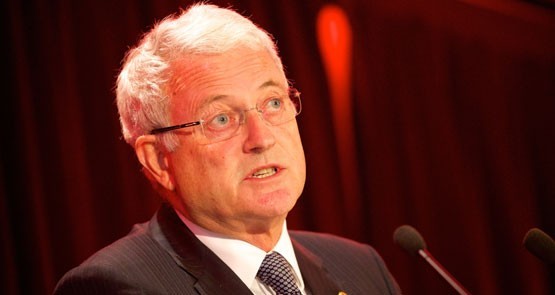
Michael Chaney
After 10 pretty average years as chairman of NAB, Michael Chaney finally retired in December with the mess that was the bank’s UK adventure still very much a blot in his copybook.
However, the Perth-based former CEO of Wesfarmers is not slowing down for a moment. Instead, he has just returned as non-executive chairman of Wesfarmers — which he ran from 1992 until 2005 — and has wasted little time getting back into his favourite game of international expansion with the proposed $705 million acquisition of UK retailer Homebase.
Given that NAB dropped billions on its disastrous UK banks — and Chaney has admitted they should have exited in 2004 when the Irish banks were old — it is surprising that he still has an appetite for risking shareholder funds in Old Dart.
Indeed, Chaney is arguably more familiar than any other Australian director with the unhappy hunting ground that the UK has been for Australian companies. He was one of the BHP directors in 2001 who backed arguably the worst deal in Australian history, giving 42% of BHP to the shareholders of London-based Billiton Plc for a rag tag of pretty ordinary second-tier mining assets.
At 65, Chaney is a pretty old “new” chairman at Wesfarmers, but he has nothing on David Crawford, who stepped up as the “new chairman” of South32 at the age of 71, after 21 years on the BHP board.
Chaney’s other big gig is as the chairman of Woodside Energy, where his expansionist tendencies have also been on display in recent years with the ill-timed US$2.7 billion purchase of some Apache assets in late 2014, plus the recent aborted $11.6 billion hostile takeover bid for Oil Search.
Chaney joined the Woodside board in 2005 and became chairman in 2007. It will be interesting to see at the forthcoming AGM in Perth whether he will commit to retiring at the end of his current term in 2017.
At the top of his “to do” list before retiring is securing Woodside’s independence from 13.6% shareholder Shell, which still has two nominees sitting inside the Woodside boardroom, despite the obvious conflict of interest.
Independence would have been achieved with the proposed 2014 buyback of a 10% stake from Shell, but shareholders sensibly rejected the proposal because it gave Shell special access to the company’s large pool of franking credits.
Similarly, the Oil Search deal would also have facilitated an independent Woodside because Shell’s stake would have been diluted down below the 10% threshold, which gives it board representation rights under the shareholders’ agreement with Woodside.
Before its first 10% sell-down in November 2010, Shell owned 34.27% of the Woodside shares and had three out of nine board seats.
This was subsequently reduced to two nominees after the 2011 AGM because its stake had been cut to 24.27%.
However, there has been no further reduction since the June 2014 sell-down of another 10% block. Given that Shell only owns 13.6% of Woodside, why does it currently have two out of nine board seats?
This issue was not raised at the 2015 Woodside AGM, when neither of the Shell nominees were up for election.
However, 67-year-old Shell veteran Andrew Jamieson, who has been on the board for 11 years, is facing re-election at the April 21 AGM, should he choose to stand.
What will the Chaney-led board say? Shouldn’t it be one out of eight, which represents 12.5% of board seats, or 14.28% if you exclude CEO Peter Coleman?
Woodside has never had a contested board election in its 60-year history. Nominations close on February 15, and any of the company’s 220,000-plus shareholders can self-nominate if they’d like to create a contest with the Shell man, Andrew Jamieson.
Rather than proposing even more risky offshore takeover deals like the Oil Search bid to dispose of Shell’s boardroom influence at Woodside, maybe Chaney should try the old approach of just recommending independent shareholders vote against him at the forthcoming AGM.








If one can’t convince enough shareholders what is to be done, it’s unlikely you will get your way, is it.